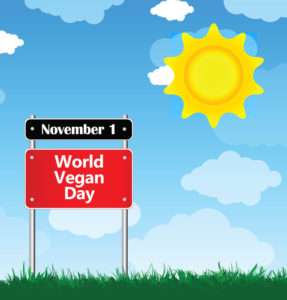 November 1 is World Vegan Day marking 75 years since the word vegan was coined. Even though the concept of veganism has been around for a while, there are plenty of misconceptions about it. Here are five things to know about veganism.
November 1 is World Vegan Day marking 75 years since the word vegan was coined. Even though the concept of veganism has been around for a while, there are plenty of misconceptions about it. Here are five things to know about veganism.
- For most people, going vegan is a process, not an overnight transformation. Staying focused on that process, making one choice at a time, can make the endeavor seem way less daunting. That is, instead of worrying about whether you can ever be vegan, just start making more vegan choices and see where you end up.
- Veganism is not a diet. According to the Vegan Society, it is “a way of living which seeks to exclude, as far as is possible and practicable, all forms of exploitation of, and cruelty to, animals for food, clothing or any other purpose.” You could just as easily start with a focus on cruelty-free personal care and cleaning products, or non-wool yarn if you’re a knitter, or by swearing off all forms of entertainment that involve animals. A mix of steps that involve diet choices as well as wardrobe, personal care, craft, and household purchases, can keep you moving forward. It gives you more opportunities to make choices that reduce your reliance on animal products. Keeping at least part of your focus on food choices is important, though, because it’s where purchases have the biggest impact on animals. For example, you might start your foray into veganism by doing these three things: stop eating chicken (it’s tremendously impactful on animal suffering), commit to buying cruelty-free cleaning products (it’s relatively easy), and explore vegan craft supplies (it’s fun).
- There is no one right way to eat as a vegan. For everyone, vegan or not, it’s a good idea to build meals around legumes, nuts, seeds, vegetables, fruits, whole grains, and healthy fats, and to eat fewer sweets and foods made with lots of refined carbs. But you’ll probably find that a vegan diet is easier and more enjoyable if you allow some flexibility in your menus. It’s okay to take advantage of vegan versions of foods that mimic familiar animal products like burgers, sausages, and cheese if it makes a vegan diet feel more realistic to you. And added fats and treats can fit in a healthy vegan diet.
- Good nutrition doesn’t just happen. It takes a little knowledge and attention. Learning a few tips for meeting nutrient needs on a vegan diet can give you confidence and a sense of security in moving forward. To eliminate any worry you might have about nutrition, this short article has everything you need to know.
- Veganism is about intention and effort, not perfection. For one thing, it’s impossible to avoid all animal products. Musical instruments might contain animal-derived glue, and car and bicycle tires commonly contain animal ingredients. Many people need medications that are tested are animals. Sometimes, like in the case of vaccines, the responsible choice is a non-vegan one. It’s much easier to find vegan alternatives to traditional animal-derived products today than it was 75 years ago, but there is still no way to avoid animal products completely. This is why the Vegan Society included the “as far as possible and practicable” clause in their definition. The important thing is that every choice you can make is a way to move the world toward a more just and compassionate one for animals.

I totally agree with the process part. Often, finances or availability make it difficult, if not, impossible to be 100% vegan. If asked, I say I’m a vegetarian that does mostly vegan.
As for diet, I cook at home from scratch, so it’s the easiest one for me. Using baking soda, vinegar and other inexpensive natural cleaners also is not too difficult. However, vegan toothpaste, shampoos, make-up, etc. is honestly expensive and hard to find.
In your plant plate you recommend greens & in your book too.Should we be concerned about the food safety risks https://examine.com/nutrition/lettuce-safety/ Is there any difference between the risk in the UK and the US.If one is in the risk category (already has IBS,weakened immune system,elderly,children etc…) should one avoid brussel sprouts,kale,bagged lettuce (potted lettuce from supermarket?)
Thanks!
I’m talking about greens like kale, collards, etc, which tend to have fewer problems in this regard than lettuce. I’d recommend cooking them if you’re concerned, though.